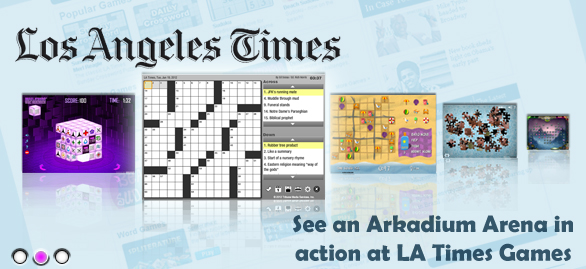Digital Media Wire’s New York Games conference kicks off tomorrow with a keynote by a different kind of game company, one that stresses success in the digital games business comes from a careful platform strategy and not necessarily chasing big hits. New York-based Arkadium thrives on following a model that contrasts someone like a Rovio, which found huge success in digital games seemingly overnight with its first Angry Birds game. While not exactly a household name, Arkadium has been around for 12 years making games for a huge segment of the casual gaming audience, the ones who dawdle on web sites for their favorite TV shows and online portals for major media companies.
 Arkadium co-founders Kenny Rosenblatt and Jessica Rovello
Arkadium co-founders Kenny Rosenblatt and Jessica RovelloArkadium is co-founded by husband and wife team Jessica Rovello and Kenny Rosenblatt. They’ve released more than 300 games. According to Rosenblatt, they boast about 10 million active users. Yet while the company’s games are on the most popular digital game platforms, Facebook, iOS and Android included, it credits its longevity to platform partnerships with companies like Comcast, Xfinity, CNN, the Discovery Channel and, most recently, Microsoft.
Ned Sherman, CEO and publisher of Digital Media Wire, says Arkadium is perfect for its conference keynote. For its New York event, DMW turned the focus to helping digital game makers find the money. Many of the sessions revolve around monetization, and the speaker list has that air of pairing successful players in the space, whether game makers, publishers or marketers, with up-and-comers. Aside from knowledge sharing, there’s also the opportunity for more meaningful partnerships, for instance attracting investors. One of the programs on the conference agenda is a pitch session where a handful of promising startups have a chance to present their business plan to a panel of venture capital firms.
“As it becomes increasingly more difficult for indie developers to reach an audience, there is a greater need for them to partner with companies like Arkadium that have the experience, resources and channels to reach an audience and increase the chances of success in a crowded market,” Sherman said.
Arkadium’s success going forward may hinge on how it’s putting a lot of attention on one platform, Windows 8. It struck a deal with Microsoft before the launch of the operating system to become a preferred games developer, and is in-fact now the official developer of updated versions of classic bundled-in Windows games like Minesweeper and Solitaire. This past spring the company turned to outside funding for the first time since its founding, raising $5 million in a series A round with Edison Ventures. That money may have gone towards what Arkadium announced some months later. In July, it said it had developed a metrics platform for Windows to rival performance data app makers get from the likes of Apple, Facebook and Google. At the time, Rosenblatt told Inside Social Games that robust analytics that could help app makers with user acquisition were one of the “major barriers” on Microsoft’s platform.
We had a chance to talk with Rovello and Rosenblatt to get more insight on how Arkadium has found success and, as a preview of tomorrow’s keynote, what it hopes to impart on other indies in the space.
Tell us about the strategy to put a good chunk of your resources behind supporting Microsoft and Windows 8.
Rosenblatt: We have always charted our own course and did what was right for the business. We saw the rise of Facebook gaming, we saw the rise of iOS and Android, and an opportunity came from Microsoft when they were launching Windows 8 to be one of the premiere providers of games on that platform, and be a close partner to Microsoft. We knew that they already had the number one gaming console, we knew that they had 800 million Windows 7 devices out there, and Microsoft had a lot of money to spend to make sure that over time Windows 8 would be a dominant platform. So we looked at the value creation from companies like Facebook and what that did for Zynga, and a company like Apple and what that did for Rovio, and we said here’s our opportunity after waiting 12 years.
We decided to commit to that platform because they knew games, and we knew over time they would gain market share on mobile and on tablets because those markets are too big for Microsft not to be a part of. So we decided to go that route because we knew the value it would build for our business long term versus trying to differentiate ourselves on Android and iOS, which are cluttered. This is our opportunity to be number one.
 Arkadium says its pre-bundled Windows 8 games reach 150 million players
Arkadium says its pre-bundled Windows 8 games reach 150 million players
DMW Conference organizers have hinted that this keynote is going to be a unique one in some respects. How will it be unique?
Rovello: I think what [people] should expect is something a little bit different. We’ve been in the industry a long time. A lot of times you don’t get a dual keynote or a husband and wife team. I think we’re just different all around. A New York audience is very different than a West Coast audience as far as our industry goes. We believe that we’re going to be speaking to a lot of people dealing with issues we were in five, six, 10 years ago. We really want to help people on how they can effectively grow their business without needing to take too much capital, without losing control, without worrying about where that next hit is coming from, and will they survive. Really it’s about smart tactical [ways] for how you can really fundamentally grow a gaming business.
As a teaser, what are some of the big takeaways attendees can expect?
Rosenblatt: What we’re trying to get across is that there are opportunities for game developers to build themselves to last. It’s very rare to find an independent game developer that’s been around for 12 years and hasn’t gotten itself scooped up by a larger game publisher. I think we’re going to be talking about one of the tactics we’ve used to stay independent, love what we do, and build a real business. One of the core principles we want to get across is that while games are a hit driven industry and a lot of game companies’ revenues are directly tied to the success of their games, there are certain tactics you can take to even that out so that even if you don’t have a successful title under your belt, there are ways to bring in the revenue and keep the lights on.
Rovello: One of the things we’ll be talking about, what Kenny was just touching on, is how to build a business for the long term without having the deep pockets that some of your competitors do. One of things we took to heart at the beginning was to be able to use our clients to extend our brand. Initially, we have a very large distribution network on the web through these top media companies and portals. They’ve been hosting and distributing our games for many, many years. For us, the way that we’re able to get above all of the noise is by establishing our game brands early on, on the web and the mobile web, through our distribution channels. In addition to spending hundreds of thousands of dollars [on promotions], we have additional marketing channels where we can get the word out about our games.
You sound like a big publisher despite being an indie, talking about building brands and channel marketing. How did it come to be that Arkadium approached its business so differently than most independent game developers?
Rosenblatt: Maybe because I come from a marketing background, or maybe just because it’s what we’ve done for so many years, it’s become ingrained in our DNA. Really we don’t think about other game developers as being our only competition. We see Netflix original content as our competition. We see HBO series as our competition. Anything that people are doing to get enjoyment for a couple minutes a day is potentially a competitor to us. We really need to think that way. It’s about media content consumption as opposed to game players. We know our demographic is so broad that it could be somebody watching Game of Thrones, or somebody who’s watching Food Network.
 Arkadium’s services include building branded game portals
Arkadium’s services include building branded game portals
Where have you had the most success with generating awareness when you launch a new game?
Rovello: We have a number of users that we can market to already. We have a large database of users who play our games prolifically. We reach out and try to get them interested. We do soft distribution through our online distribution network. We either do teasers of games or light version of games, and then we do traditional digital marketing — ad buys when titles are released, then work to get editorial coverage and spotlight promotion [in app stores] if we can.

